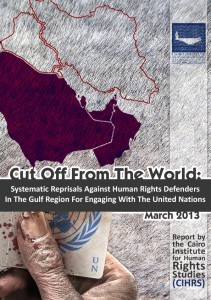Today, 12 March 2013, the Cairo Institute for Human Rights Studies (CIHRS) released a report entitled “Cut off from the World: Systematic Reprisals against Human Rights Defenders in the Gulf Region for Engaging with the United Nations” documenting attacks and acts of intimidation and defamation carried out by the governments of Bahrain, the United Arab Emirates (UAE), Saudi Arabia, and Oman against human rights defenders for their cooperation with United Nations human rights mechanisms throughout the last two years, particularly during the 21st session of the United Nations Human Rights Council (HRC) in September 2012.
The report provides an overview of the existing repressive laws in those countries that criminalize work in the field of human rights, including engagement with international human rights mechanisms. It also documents cases of reprisals and physical attack against Ahmed Mansoor, a well known rights activist and blogger in the UAE and a member of the Human Rights Watch MENA advisory committee, as well as the government affiliated media smear campaign against him and other regional and international NGOs for their participation at the proceedings of the 21st session of the HRC. In this context, it is important to note that on 4 March 2013, the trial of 94 activists commenced in the UAE before the Federal Supreme Court– almost one year since the crackdown on and arrest of activists started amid several concerns that the detainees were subjected to alleged torture and other forms of ill-treatment while held in undisclosed locations in arbitrary detention. The defendants face charges of committing crimes against national security and attempting to overthrow the ruling regime.
CIHRS believe that the acts mentioned in this report indicate a systematic retributive campaign to impede the works of human rights defenders in the Arab Gulf region and prevent the UN Human Rights Council from accessing independent accounts of on-ground human rights situation in these respective countries.
We view, with equal worry, the particular rise in aggression by government controlled media outlets in a number of Gulf monarchies, especially Bahrain and the UAE, whereby government affiliated writers and media establishments are used as tools to foster an environment of animosity against the working civil society in the country and reputable independent regional and international human rights organizations working to document cases of human rights violations within those countries.
We further believe that the current escalation to the crackdown against the defenders stems from the lack of accountability with regards to the majority of previously reported cases of reprisals, as mentioned by the UN High Commissioner for Human Rights during a panel discussing the same topic at the human rights council’s 21st session.
The report further shed light on a similar smear campaign which targeted almost all of Bahrain’s civil society delegation as well as a number of the regional and international NGOs participating at the session. This was in addition to the death threats and legal harassment against human rights defender Mohamed Al Maskati, President of the Bahrain Youth Society for Human Rights, and legal charges against Said Yousif Al-Muhafdha, Head of the Monitoring Unit and Vice President of the Bahrain Center for Human Rights, for their participation at the UN session. The report also highlights Bahrain’s record of previous reprisals against activists who engage with the UN rights mechanisms.
In Oman, a crackdown against most of the activist community in the Sultanate was initiated in the end of May 2012 and has currently resulted in prison sentences varying from 6 to 18 months against 35 activists and defenders on charges such as illegal gathering, defaming the Sultan, and violating the Cyber crimes law. Among the activists imprisoned is Mukhtar Al Hinaei, founding member of the Omani Group for Human Rights, a well known activist, blogger and journalist, who was initially targeted and questioned for his involvement with international human rights organizations and mechanisms, including providing information to the UN Special Procedures in May 2012.
On 9 March 2013, the Riyadh Criminal Court sentenced Dr. Mohammad Fahad Al-Qahtani, one of the most prominent rights advocates in Saudi Arabia and co-founder of Association for Civil and Political Rights in Saudi Arabia (ACPRA), to 10 years in prison in addition to ordering another 10 year travel ban against him. Among the charges leveled against him is using ‘false’ facts and information “as evidence to official international apparatuses (the mechanisms of the Human Rights Council of the United Nations).” This is in addition to using charges like “cooperating with international entities and organizations” to imprison and bring legal charges against other activists.
These acts of reprisals, some occurring inside the premises of the UN, should be immediately and seriously examined by the Human Rights Council, other relevant UN bodies, and UN member states with the view of ensuring non-reoccurrence and full protection for the human rights defenders involved. CIHRS asks that the Council, its Bureau and the Office of the President, take strong and concrete steps against governments who continue to target activists and NGOs for cooperating with its mechanisms. Indeed, committing a pattern of such acts should automatically trigger reconsideration of a state’s membership within the UN Human Rights Council, and strongly inform future elections for membership to the body. Additionally, such acts should serve as strong signals for the pressing need to reconsider the criteria for membership of states at the Council.
Share this Post


